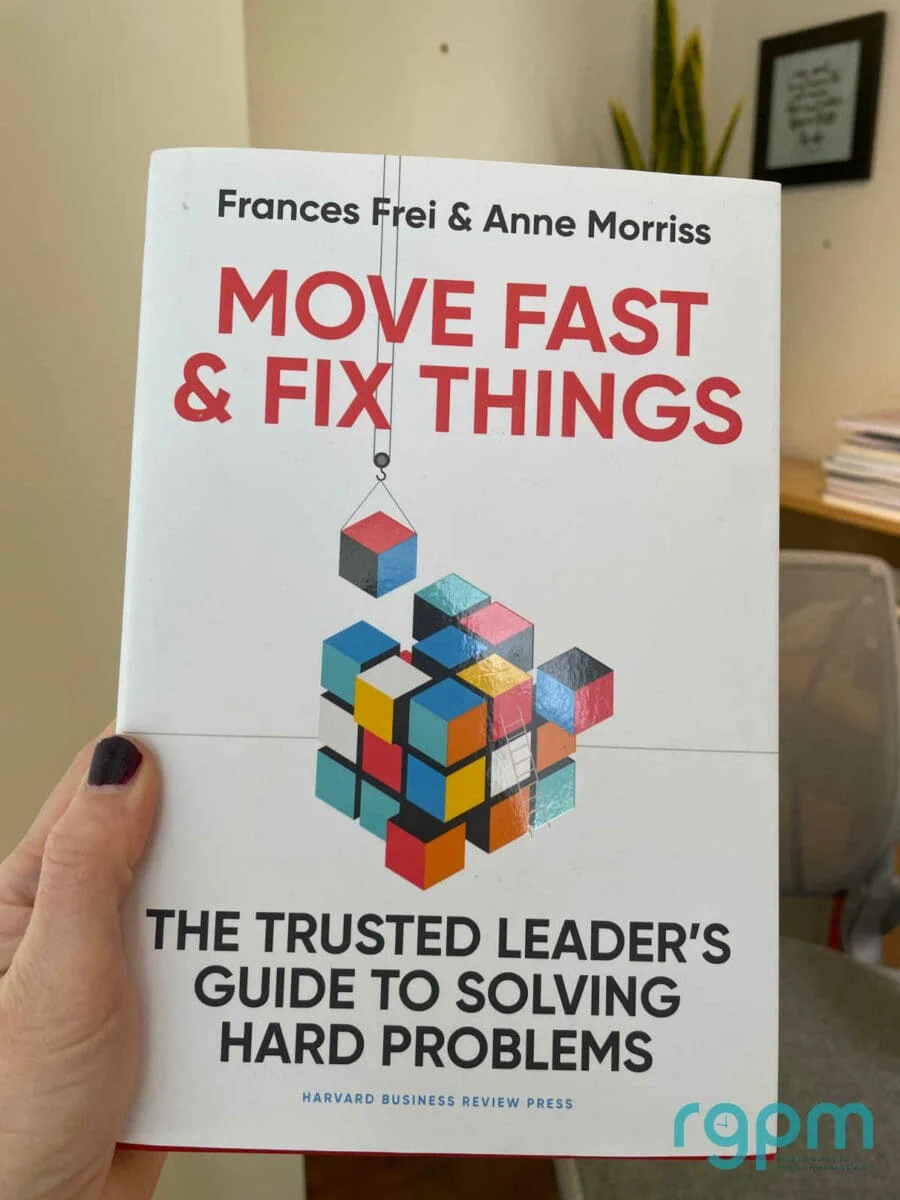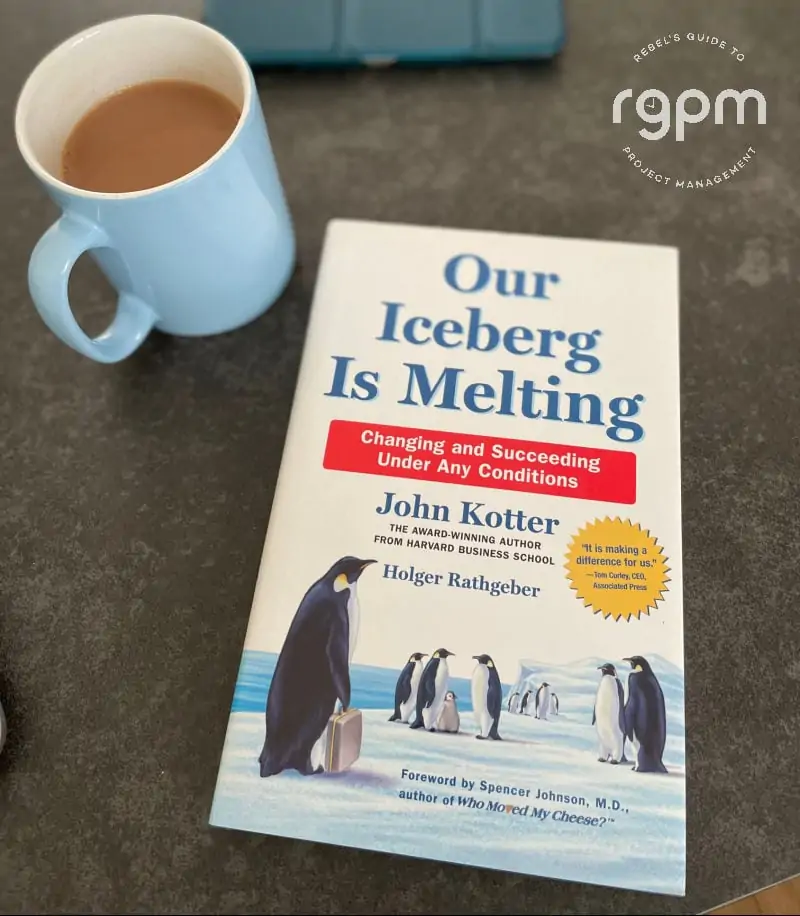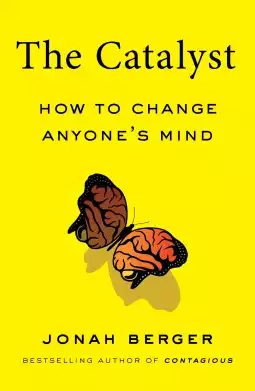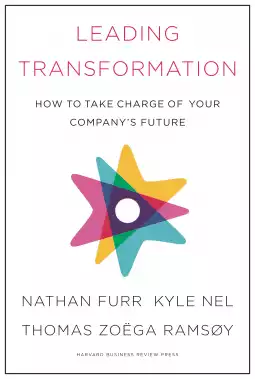Top 15 Books on Change Management (2026 edition)
This blog is reader-supported. When you purchase something through an affiliate link on this site, I may earn some coffee money. Thanks! Learn more.
Change management is so important for making sure that the change you deliver is embedded in the organization. In other words, if you want people to use what you create — or to shift their ways of working to the new standards and processes you implement — then you have to help them through the transition.
Here’s my list of top
See this list (and some extras) on Amazon.
Short on time?
Buy Leading Change by John P. Kotter. It’s my top pick.
Managing Transitions by William and Susan Bridges is the next one I’d pick up if I were you or for a practical ‘how to actually do
How I chose these books
I looked for:
- Writing style and whether they were engaging and easy to follow
- Contents — how much did the book provide in terms of things you could repeat yourself at work?
- Inspiration — how did I feel after reading the book? Was I inspired to put the ideas into practice?
- Relevance — how modern is the book and how useful does it feel in today’s working world?
1. Leading Change by John P. Kotter
Professor John P. Kotter is a leading authority in
Yes, 2012 was some way back, but this book is rather an institution, and still relevant today.
Kotter’s way isn’t the only way to manage organizational change, but it’s a common model now and it’s helpful to understand the process so you can see what, if anything, you want to apply to your own projects.
Kotter’s 8-step change process is:
- Create a sense of urgency
- Form a guiding coalition as the change team
- Create a vision for the change
- Communicate the vision
- Empower people to take action by removing barriers
- Create the opportunity for quick, short-term wins
- Build on the change incrementally
- Make it stick for the long term.
That’s a super high-level overview, and the book goes into it in much more detail.
Best for: Getting a general overview and a clear process for ‘doing’ change.
2. Our Iceberg is Melting by John P. Kotter
Another book by Kotter, Our Iceberg is Melting: Changing and Succeeding Under Any Conditions, is an easy read about why the ‘burning platform’ is essential to help businesses move to new ways of doing things.
I loved this book when I read it: it’s a business fable (which is not a type of book I like to read) but it’s fun, and it definitely gets the message across. It’s about a group of penguins living on an iceberg and how they come to terms with what their next steps should be. You’ll read it and be nodding along: “Oh, that’s just like my colleague X.”
The point of the book is to highlight different archetypes: the types of colleagues you will most likely be working with (or who will be blocking the change) during the project. When you better understand what drives them, you can create a change plan that supports everyone’s needs and brings people together behind the vision.
Oh, a ‘burning platform’ is where the change is so extreme you have to jump from the burning platform into the sea in order to move forward (and survive) and there is no going back. We had one of these on my largest project to date and it was an awesome way of helping people understand why we were going ahead with the change.
3. Build, Excite, Equip by Nicola Graham
Build, Excite, Equip by Nicola Graham is a really practical guide to how to do
It’s got tools and techniques, checklists and things you can implement straight away. I liked the practical tone and the fact it felt real and reasonable.
The method is solid, easier to implement than others and aimed at people working in project-based roles. There is also a training course that goes along with the book.
Watch a video of the author explaining the method below.
4. HBR’s 10 Must Reads on Change Management
The HBR Must Reads series is interesting and they’ve added Change Management to the stable. There is also a Change Management Vol 2 with a bonus article from John Kotter, if you want even more.
The thing I’ve found with these essay-based books is that they aren’t very implementable. Great for talking points and theories, great for challenging the status quo and for informing ideas back to your boss, but hard to find the nuggets to put into use in your job.
Quite a quick read, so you’ll get through this in no time and feel more informed at the end of it.
5. Making Sense of Change Management by Esther Cameron and Mike Green
Making Sense of Change Management: A Complete Guide to the Models, Tools, and Techniques of Organizational Change is now in its sixth edition.
It’s a bestseller, billed as the “definitive” guide to
Aimed at people doing
I think this book is more for transformative, disruptive, organizational change instead of project-led ‘small’ change, but the theories, case studies, and techniques can definitely be applied to a project environment.
The sixth edition includes a lot of information on change for reasons of sustainability and some content that I didn’t find hugely relevant because I already believe in the impacts of climate change and the chapter on personal alchemy and reconnecting to the world was a little woo for me, but the earlier parts of the book are well-researched and solid.
6. The Effective Change Manager’s Handbook edited by Richard Smith et al
The Effective Change Manager’s Handbook: Essential Guidance to the Change Management Body of Knowledge is an accessible and practical guide to what change managers actually do.
It has chapters written by well-respected practitioners, so while you will pick up the theory, the aim of the book is to make it possible for you to do
Aimed at people who don’t necessarily have the job title of change manager, if you deliver change as part of your role, you’ll find something useful in here to help. People who have change manager job titles may find other books a bit more useful, but often project managers are expected to do the change part of the work as well, without any formal training or guidance. This book is a good starting point.
The topics covered include sustaining change, change readiness, and there’s a section specifically on change in a project management setting. There’s also a substantial section on facilitation because talking to people is so much of what
I’m always a bit wary of books written by multiple authors. While you get a great selection of voices and the book can include more expertise than a single-author book, sometimes they feel like the chapters don’t hang together well.
Also, this one is a bit old, and hasn’t been updated for the latest CMBOK, so watch out for that.
7. The Theory and Practice of Change Management by John Hayes
This is another book that has had multiple editions, so be sure to get the latest version. The Theory and Practice of Change Management is a bestseller in the field but feels to me less accessible than some of the others on this list as it’s really essential reading for final year MBA and
The 7th edition came out in November 2025 but it’s EXPENSIVE, so see if you can get a previous edition at a reduced price if budget is an issue. The new version includes sections on building trust and hybrid working practices as well as a new tool called the Cognitive Style Index, but I think the previous edition is still very solid.
This book is probably not the best one to start with, but it’s a well-respected guide to the field so it felt wrong to leave it out!
Best for: This one would suit you if you work in a large organization in the role of change manager, or feel that is a route you would like to go in the future. It’s essential reading if you are studying change or organizational leadership.

8. Crucial Conversations by Kerry Patterson et al
Crucial Conversations Tools for Talking When Stakes Are High (3rd edition) is a frequently recommended book. This is less about the theory of
It’s a reasonably priced book that will do well on your shelf for all kinds of situations, not just managing change at work. So many of the conversations we have to have as project managers need to be brave conversations. Whether you are providing feedback to someone who has failed to complete a task as expected to the required level, coaching an underperformer, or telling a customer that their deliverables aren’t ready, a lot of our conversations fall into the ‘difficult’ criteria.
This book will give you a rounded overview of how to face these conversations by preparing and reacting in the situation as necessary. You’ll feel more confident, and that’s really the goal, isn’t it?
9. Switch by Chip and Dan Heath
Chip and Dan Heath have written some great books, and Switch: How to change things when change is their well-read take on
Although this book was written in 2010, there is still lots of good theory in it that you can use.
It’s a good guide to overcoming resistance to change, and its easy-to-read style means you’ll pick up nuggets of information without it feeling like your reading time is work time. You can pack this one in your commuting bag or grab the audio book version to listen to during your workout/run/baking time etc.
Best for: Readers short on time.
10. The Catalyst by Jonah Berger
The Catalyst (2020) is so good! There are so many wonderful examples in it, and I sat reading in the Waitrose cafe with avocado on toast not noticing the time passing. It’s a book about how to reduce resistance to change through removing the roadblocks.
Instead of pushing harder, first, seek to understand. Then you can dismantle the objections one at a time. Berger gives you a step-by-step guide to do exactly that. The case studies and examples are brilliant, and help illustrate his points with such clarity.
You’ll come away from this book with a totally different outlook on why people make the decisions they do and why they hold their points of view. Once that window in your brain has been opened, it will never close.
This one is a must-read.
Best for: Changing your world view!
11. Leading Transformation by Nathan Furr, Kyle Nel, and Thomas Zoega Ramsoy
Leading Transformation: How to Take Charge of Your Company’s Future by Nathan Furr, Kyle Nel, and Thomas Zoega Ramsoy was an interesting read, but I’m not sure how repeatable the case study would be.
The book basically shares a fascinating business case study that resulted in organizational transformation. It draws heavily on neuroscience and
You’d need a brave organization to replicate the results, but there are tools in here in your own projects, especially around the use of stories to communicate the vision of the new world. Using visual tools to get your message across is not a new idea, but doing it with comics and in such an innovative way was a new take for me.
Best for: People who want to read about how other companies do it.
12. Managing Transitions by William Bridges and Susan Bridges
Managing Transitions by William Bridges and Susan Bridges is a classic, now in its 4th edition, so make sure you get the most recent one. The idea behind this book is that it isn’t the change itself that does you in, it’s the transition. The process of going through the change is the hard part: manage that, and we’ll all come out the other side just fine.
It’s a practical, well-meaning book that will help you navigate changes at work. I like the useful appendices and the ‘transition readiness’ checker because that will help you spot some of the essentials to get in place before you take your team through a change, or go through one yourself.
Best for: People approaching a change that is going to significantly impact how people do their jobs.
13. The Effective Change Manager: The Change Management Body of Knowledge
This is the gold standard book about
The Effective Change Manager: The Change Management Body of Knowledge from the
It covers the competency model for change managers, what change managers must know and what they do. It covers practice and theory as well as human dynamics and organizational context.
CMI members get a discount on physical copies.
Best for: People in
14. The Change Practice Playbook
Another publication from the
It’s not a step-by-step guide, more of a list of options and strategies for you to pick from. It’s organized by stage of the change (not stage of the project) so defining, analyzing, co-designing, delivering and refining the change.
Best for: As a desk reference for leaders.

15. Move Fast and Fix Things: The Trusted Leader’s Guide to Solving Hard Problems by Frances Frei and Anne Morriss
Move Fast and Fix Things: The Trusted Leader’s Guide to Solving Hard Problems is a fun and engaging read.
It’s designed for leaders who want to make improvements in their teams while also building a culture of success and trust along the way. The improvements are likely to be smaller changes, such as fixing processes and dealing differently with customers — responding to all those things in the suggestion box.
It’s a playbook for taking action and delivering change, covering a 5-step approach, which they (rather ambitiously) lay out in a week so you can keep momentum up. And you can get a lot done in a week if you truly want to.
Best for: leaders who want to identify problems behind performance issues and fix them
Your reading list
And that’s your reading list for
Looking for some immediate tools on
If you are looking for some other suggestions for project management books to read, you can check these out:
- Best PRINCE2® books
- Books by Elizabeth Harrin (that’s me!)
- Best books on project collaboration
- Best leadership books for project managers
- 8 must read books on stakeholder management
Which one will you read first?




